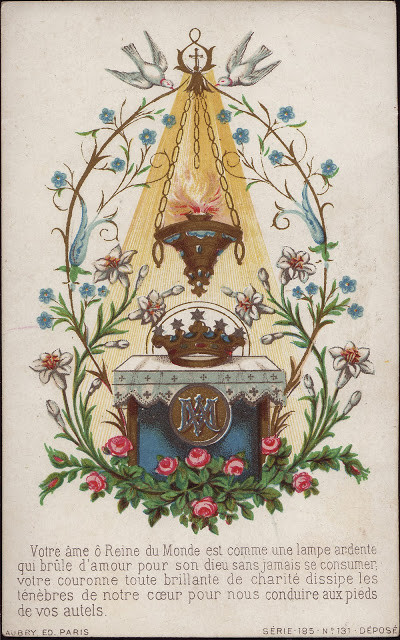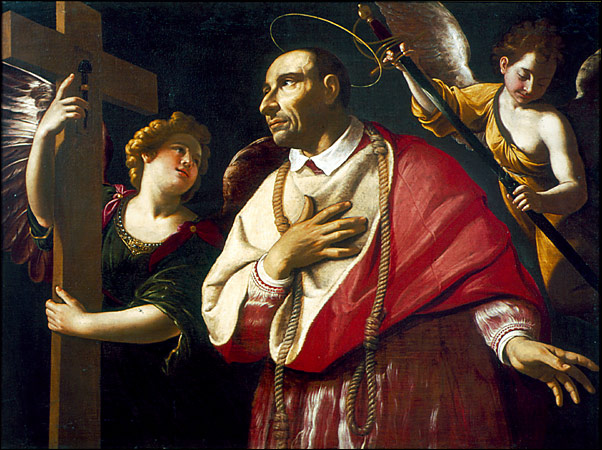Of the sweetness of the name of Mary during life and at
death. ~ adapted from St. Alphonsus de Liguori, Glories of Mary Ch.
X
The great name of Mary, which was given to the Divine
Mother, did not come to her from her parents, nor was it given to her by the
mind or will of man, as is the case with all other names that are imposed in
this world ; but it came from heaven, and was given her by a Divine ordinance.
This is attested by St. Jerome, St. Epiphanius, St. Antoninus, and others. ‘The
name of Mary came from the treasury of the Divinity,' says St. Peter Damian. Ah!
yes, O Mary, it was from that treasury that thy high and admirable name came
forth ; for the most Blessed Trinity, says Richard of St. Lawrence, bestowed on
thee a name above every other name after that of thy Son, and ennobled it with
such majesty and power, that He willed that all heaven, earth, and hell, on
only hearing it, should fall down and venerate it: ' The whole Trinity, O Mary,
gave thee a name after that of thy Son above every other name, that in thy name
every knee should bow, of things in heaven, on earth, and under the earth.'
We gather from the sacred Canticles, that on the
assumption of our Blessed Lady, the angels asked her name three times. “Who is
she that goeth up by the desert as a pillar of smoke?" Again, “Who is she
that cometh forth as the morning rising?" And again, "Who is this
that cometh up from the desert, flowing with delights?" ‘And, why,' says
Richard of St. Lawrence, ' do the angels so often ask the name of their Queen?'
He answers, ' that it was so sweet even to the angels to hear it pronounced,
that they desired to hear that sweet name in reply.'
There is a salutary sweetness of consolation, of love,
of joy, of confidence, of strength, which the name of Mary ordinarily brings to
those who pronounce it with devotion. After the most sacred name of Jesus the
name of Mary is so rich in every good thing, that on earth, and in heaven,
there is no other from which devout souls receive so much grace, hope, and
sweetness. ' For,' he continues, 'there is something so admirable, sweet, and
divine in this name of Mary, that when it meets with friendly hearts it
breathes into them an odour of delightful sweetness.' And, he adds, 'that the
wonder of this great name is, that if heard by the lovers of Mary a thousand
times, it is always heard again with renewed pleasure, for they always
experience the same sweetness each time it is pronounced.'
In fine, ' thy name, O Mother of God, is filled with
Divine graces and blessings,' as St. Methodius says. So much so, that St.
Bonaventure declares, ' that thy name, O Mary, cannot be pronounced without
bringing some grace to him who does so devoutly.' The blessed Raymond Jordano
says, 'that however hardened and diffident a heart may be, the name of this
most Blessed Virgin has such efficacy, that if it is only pronounced, that
heart will be wonderfully softened.' I will, however, give his own words. ' The
power of thy most holy name, O ever blessed Virgin Mary, is such, that it
softens the hardness of the human heart in a wonderful manner.' He then tells us
that it is she who leads sinners to the hope of pardon and grace : ''Thy most
sweet name, O Mary,' according to St. Ambrose, ' is a precious ointment, which
breathes forth the odour of Divine grace.' The Saint then prays to the Divine
Mother, saying : ' Let this ointment of salvation enter the inmost recesses of
our souls: that is, grant, O Lady, that we may often remember to name thee with
love and confidence; for this practice either shows the possession of Divine
grace, or else is a pledge that we shall soon recover it. '
The name of Mary heals sinners; rejoices hearts, and
inflames them with Divine love. Hence Richard of St. Lawrence ' encourages
sinners to have recourse to this great name,' because it alone will suffice to
cure them of all their evils; and ' there is no disorder, however malignant,
that does not immediately yield to the power of the name of Mary.' On the other
hand, Thomas a Kempis affirms, 'that the devils fear the Queen of Heaven to
such a degree that on only hearing her great name pronounced, they fly from him
who does so as from a burning fire.' The Blessed Virgin herself revealed to St.
Bridget ' that there is not on earth a sinner, however devoid he may be of the
love of God, from whom the devil is not obliged immediately to fly, if he
invokes her holy name with a determination to repent.' On another occasion she
repeated the same thing to St. Bridget saying, ' that all the devils fear her
name to such a degree, that on hearing it they immediately loosen the claws
with which they hold the soul captive.' Our Blessed Lady also told St. Bridget,
' that in the same way as the rebel angels fly from sinners who invoke the name
of Mary, so also do 'the good angels approach nearer to just souls who pronounce
her name with devotion.'
In fine, 'This admirable name of our Sovereign Lady,'
says Richard of St. Lawrence, ' is like a fortified tower, in which, if a
sinner takes refuge, he will be delivered from death; for it defends and saves
even the most abandoned.' But it is a tower of strength, which not only
delivers sinners from chastisement, but also defends the just from the assaults
of hell. Thus the same Richard says, 'that after the name of Jesus, there is no
other in which men find such powerful assistance and salvation as in the great
name of Mary.' He says, ' there is not such powerful help in any name, nor is
there any other name given to men, after that of Jesus, from which so much
salvation is poured forth upon men as from the name of Mary.'
It is well known, and is daily experienced by the
clients of Mary, that her powerful name gives the particular strength necessary
to overcome temptations against purity.' The same author, in his commentary on
the words of St. Luke, “and the Virgin's name was Mary," remarks that
these two words, Mary and Virgin, are joined together by the Evangelist, to
denote that the name of this most pure Virgin should always be coupled with the
virtue of chastity.' Hence St. Peter Chrysologus says, ' that the name of Mary
is an indication of chastity;' meaning, that when we doubt as to whether we
have consented to thoughts against this virtue, if we remember having invoked
the name of Mary, we have a certain proof that we have not sinned. Let us,
therefore, always take advantage of the beautiful advice given us by St.
Bernard, in these words:’
In dangers, in perplexities, in doubtful cases, think
of Mary, call on Mary; let her not leave thy lips; let her not depart from thy
heart.'
In every danger of forfeiting Divine grace, we should
think of Mary, and invoke her name, together with that of Jesus; for these two
names always go together. Consoling indeed are the promises of help made by
Jesus Christ, to those who have devotion to the name of Mary; for one day, in
the hearing of St. Bridget, He promised His most holy Mother that He would
grant three special graces to those who invoke that holy name with confidence :
first, that He would grant them perfect sorrow for their sins ; second, that
their crimes should be atoned for ; and, thirdly, strength to attain
perfection, and at length the glory of paradise' And then our Divine Saviour
added : ' For thy words, O my Mother, are so sweet and agreeable to me, that I
cannot deny what thou askest.'
 Cornelius, a Roman by birth, was sovereign Pontiff
during the reign of the emperors Gallus and Volusianus. In concert with a holy
lady named Lucina, he translated the bodies of St. Peter and St. Paul from the
catacombs to a more honourable resting place. St. Paul’s body was entombed by
Lucina on an estate of hers on the Ostian Way, close to the spot where he had
been be headed; while Cornelius laid the body of the Prince of the apostles
near the place of his crucifixion. When this became known to the emperors, and
they were moreover informed that, by the advice of the Pontiff, many became
Christians, Cornelius was exiled to Centumcellae, where Cyprian, bishop of
Carthage, wrote to him to console him.
Cornelius, a Roman by birth, was sovereign Pontiff
during the reign of the emperors Gallus and Volusianus. In concert with a holy
lady named Lucina, he translated the bodies of St. Peter and St. Paul from the
catacombs to a more honourable resting place. St. Paul’s body was entombed by
Lucina on an estate of hers on the Ostian Way, close to the spot where he had
been be headed; while Cornelius laid the body of the Prince of the apostles
near the place of his crucifixion. When this became known to the emperors, and
they were moreover informed that, by the advice of the Pontiff, many became
Christians, Cornelius was exiled to Centumcellae, where Cyprian, bishop of
Carthage, wrote to him to console him.  Cyprian was a native of Africa, and at first taught rhetoric
there with great applause. The priest Caecilius, from whom he adopted his
surname persuaded him to become a Christian. Thereupon, Cyprian distributed all
his goods among the poor. Not long afterwards, having been made priest, he was
chosen bishop of Carthage. It would be useless to enlarge upon his genius,
since his works out shine the sun. He suffered under the emperors Valerian and
Gallienus, in the eighth persecution, on the same day as Cornelius was martyred
at Rome, but not in the same year.
Cyprian was a native of Africa, and at first taught rhetoric
there with great applause. The priest Caecilius, from whom he adopted his
surname persuaded him to become a Christian. Thereupon, Cyprian distributed all
his goods among the poor. Not long afterwards, having been made priest, he was
chosen bishop of Carthage. It would be useless to enlarge upon his genius,
since his works out shine the sun. He suffered under the emperors Valerian and
Gallienus, in the eighth persecution, on the same day as Cornelius was martyred
at Rome, but not in the same year. 









